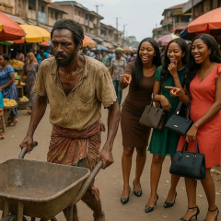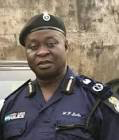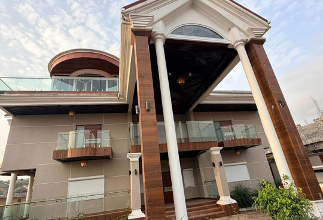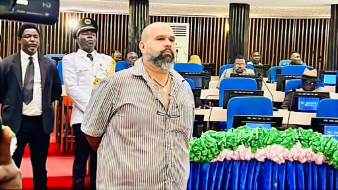Wheelbarrow Pusher Becomes Rich After Public Insults and Abandonment

The sun was merciless that afternoon, pouring its heat down like punishment on the busy streets of Onitsha. Chijioke’s skin was browned from years of exposure, his hands calloused from pushing his wheelbarrow through tight markets and uphill roads. He had just finished delivering a load of yams to a woman in Ose Market and was making his way back, tired but hopeful. Business had been rough, but today, he had made a little more than usual. It was enough to buy garri, sugar and a little amount to send to his mother in the village.
As he paused by a roadside kiosk to buy pure water, he heard a voice he hadn’t heard in years — sharp, familiar, and once dear.
“Is that not Chijioke?” the voice echoed.
He turned, and his heart thudded. Ada. Beautiful, proud Ada. The same Ada he had once given his heart to in their village school. Now she stood radiant in makeup and fancy clothes, flanked by two other girls.
He smiled awkwardly, lifting his hand in greeting. “Ada, long time—”
She cut him off with a mocking laugh. “Chijioke! You still dey push barrow? Haba! Na wa o. Look at your mates! They drive cars, they wear suits. And you?” Her friends burst into laughter. One even took out her phone to snap a picture.
A small crowd began to gather. Traders stopped. Bus conductors paused their chants. People stared. Chijioke’s heart sank. He felt like the ground should open and swallow him.
“I used to like you before,” Ada continued, “but now I thank God I said no to you. See your life!”
He stood rooted, too stunned to speak. The bottle of water slipped from his hand. His eyes burned with unshed tears, but he wouldn’t let them fall. Instead, he picked up his barrow slowly, nodded once, and pushed it forward. Each step felt like a hundred lashes to his pride. People whispered, others laughed, some just watched. It was the longest walk of his life.
By the time he reached the edge of the market, his legs were shaking. He veered off the main road, found a quiet spot behind an abandoned shop, and sat on a broken cement slab. For the first time in years, he let the tears come. He cried for his dreams, for his shame, for his father who had died too soon, for the mother whose body was fading from sickness. He cried for being mocked, for being poor, for being helpless.
But somewhere in the middle of the tears, a thought began to grow. What if this was not the end? What if her insult was a mirror showing him who he’d become — and who he could still be? The pain turned into fire. A quiet vow formed in his heart: They will never laugh at me like this again.
Four years had passed since Chijioke left barrow pushing behind. Today, he sat behind the wheel of his black Toyota Highlander, the leather steering cool beneath his fingers. He wasn’t just surviving now — he was thriving. His food distribution business had expanded to three cities in the Southeast. He employed over 20 workers. He had rented a decent home for Mama and paid for his younger brother’s university education. Life had changed.
But one thing still tugged at his heart — not pain anymore, but memory. The day Ada mocked him in public had shaped him more than any book or lesson. That moment had branded itself deep into his spirit. Now, he felt ready to revisit that junction — not for revenge, but for closure.
That afternoon, he took a quiet drive to Ochanja Market. The streets were still familiar: the noise, the smells, the hustle. He parked a little distance away and walked, dressed in clean, simple clothes — nothing flashy, but enough to show how far he’d come.
As he approached the same spot where it had all happened, his steps slowed. And then he saw her.
Ada stood by a small table near the junction, selling hair relaxers and earrings under a faded umbrella. The loud confidence that once cloaked her had faded. Her makeup was smudged, her face older, worn by stress. She looked up briefly — and froze.
“Chijioke?” she called uncertainly.
He smiled gently. “Yes. Long time.”
She stared, blinking. “Is… is this your car?”
He nodded. “One of them.”
Silence hung in the air like a heavy cloth.
Ada stepped forward. “I heard stories, but I didn’t believe them. That you became rich. That you now supply supermarkets and schools.” She laughed nervously. “Life is strange, eh?”
“It is,” Chijioke replied calmly.
“I… I’ve been meaning to reach out,” she began, eyes darting. “You know, we were young. I didn’t mean to embarrass you that day—”
He raised his hand gently. “It’s okay. You taught me something I needed to learn. I should thank you.”
Her eyes welled with tears. “Things haven’t been easy. I lost my job during COVID. My parents are sick. I’m just trying to survive.”
Chijioke nodded slowly. “I understand. I’ve been there.”
She looked at him with hope. “Maybe you can help me? I can work — anything. I just need a chance.”
He paused, then reached into his pocket and handed her a business card. “Call this number. Speak to Kemi, my HR. We’re opening a new branch in Awka. She’ll guide you.”
“Chijioke… thank you,” she whispered.
As he walked back to his car, people in the market stared — not with mockery, but with admiration. Some whispered, “Na that boy wey push barrow before… see am now.”
He didn’t need to respond. He didn’t need validation. His journey had already spoken louder than any insult ever could.
And in that moment, Chijioke realized: success isn’t revenge.





